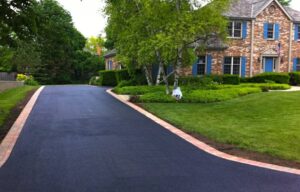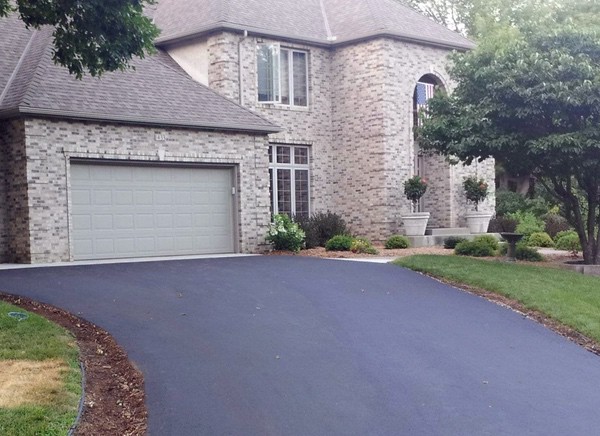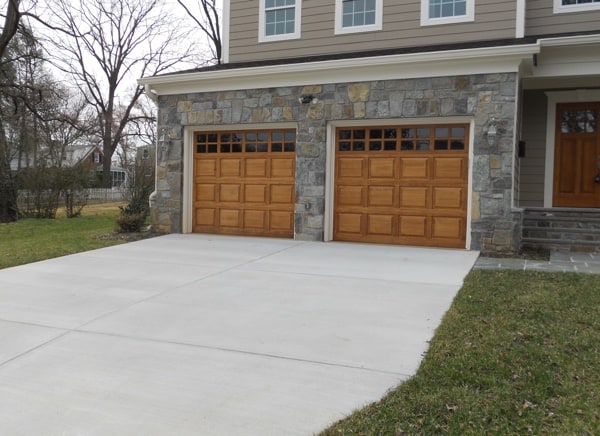 Your driveway should last anywhere from 15 to 35 years – if you take care of it well.
Your driveway should last anywhere from 15 to 35 years – if you take care of it well.
The average homeowner pays anywhere from $1,000 to $5,000 — and even into five-figure territory — to tear up and repour a new driveway. Although the cost varies depending on driveway length, material and shape, one thing’s for sure – it’s not cheap. Such a large investment, especially for an item so heavily used, certainly needs to be taken care of adequately.
Once installed, the life of your driveway is calculated based on the materials from which it’s paved, weather conditions and good old-fashioned TLC. While it’s difficult to control what exactly happens to a driveway – after all, it’s outside and at Mother Nature’s mercy — the one proactive step homeowners can take is driveway sealing.
What is driveway sealing, anyway?
In short, driveway sealing is the application of a protective coating which adds years to a driveway’s useful life.
Homeowners typically choose between asphalt or concrete when constructing a driveway. Cheaper to install and easier to maintain, asphalt is typically the go-to driveway building material. While concrete is more expensive to install and maintain, those driveways can command 10 additional usage years over asphalt. Asphalt also expands in response to the weather, while concrete cracks under extreme fluctuations or pressure.

Asphalt can be cheaper to install and easier to maintain/repair.

Concrete is more expensive but requires less maintenance.
Ironically enough, these materials are nowhere near as resilient to the elements as one would expect from something as sturdy as concrete or asphalt. Rain, snow and even UV rays and oxygen damage a driveway over time, shortening its expected decades-long lifespan. In enters driveway sealing, the top line of defense homeowners have to protect their driveway against the elements.
How pre-winter driveway sealing protects your pavement
- Driveway sealing repels rain, and consequentially, snow. It might sound counterintuitive, but rain is actually one of the most harmful substances for pavement. Moisture can deteriorate asphalt surfaces, while rain and snow can worsen any cracks in a concrete driveway. Accelerated by the snow-melting road salt, this moisture settles into the crevices and expands when it re-freezes, worsening imperfections in the pavement. Northeast homeowners who expect snowstorms and maybe even a blizzard over the course of a standard winter are particularly vulnerable to this kind of damage. Driveway sealing repels this damaging moisture, adding years to your driveway’s crack-free life.
- Sealants fill in surface damage. All that melting snow makes its way into small imperfections, tiny cracks or indecipherable dings. When the snow melts and re-freezes when the temperature drops, any moisture in the cracks expands and worsens any “cosmetic” imperfections. Driveway sealing prevents moisture from entering these imperfections in the first place by filling in surface damage.
- It serves as a repellant for oil, fuel and fluid. If your driveway is susceptible to sun and air, it goes without saying that fluids from your car will be even more harsh. Gasoline, oil, antifreeze and other fluids break down asphalt, significantly shortening your driveway’s lifespan. Driveway sealing is the protective layer which keeps these harmful materials from stripping your driveway’s surface.
How often do you need to seal your driveway?
Just like the life of your driveway can vary widely, so too can the life of your sealant. The estimates vary wildly, from annually to every 10 years. Much of this depends on the weather, if your driveway is built from asphalt or concrete, and the TLC you’re putting into your driveway in the first place. In the northeast, homeowners can expect sunshine, snow, road salt, rain and wildly-fluctuating temperatures over the course of a year. These conditions mean that annual or biennial driveway sealing will help extend the life of your investment.





